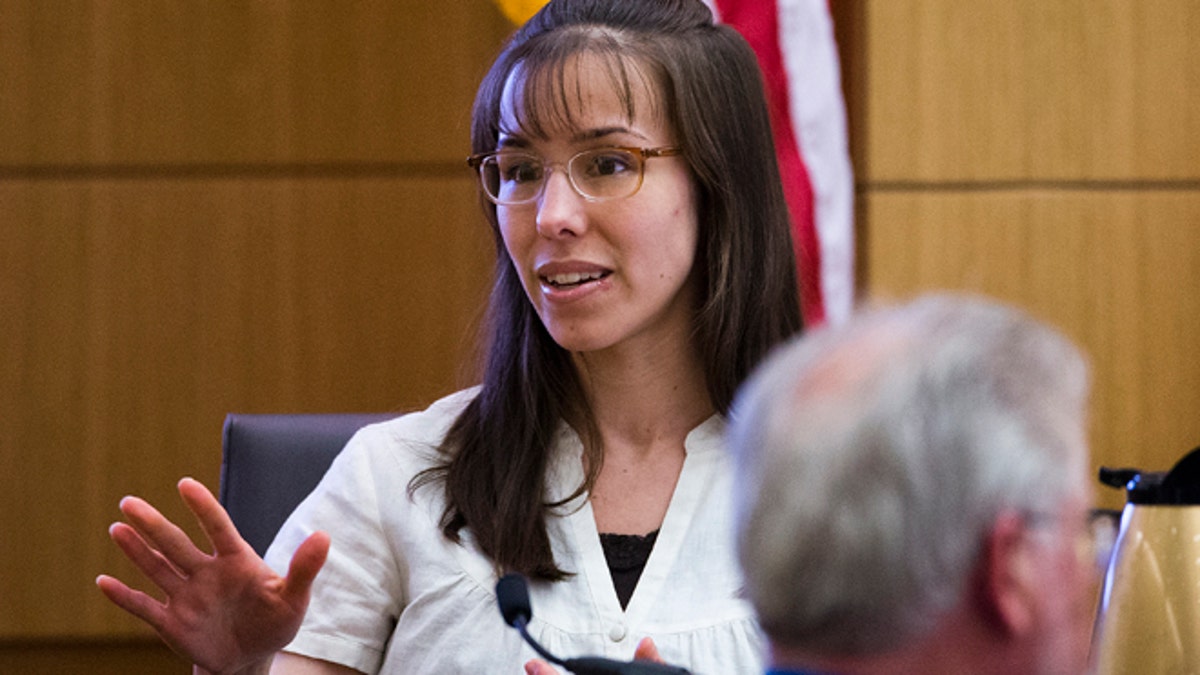
March 6, 2013: Jodi Arias answers written questions from the jury during her murder trial in Maricopa County Superior Court in Phoenix. Arias is on trial for the 2008 murder of Travis Alexander. (AP)
PHOENIX – Jurors in Jodi Arias' murder trial made it clear Thursday they aren't satisfied with her stories about why she killed her lover, then methodically covered her tracks and couldn't recall much of anything from the day.
Arias answered about 220 questions over the past two days under an uncommon Arizona law that allows juries to quiz defendants through written questions read aloud by the judge -- and the bulk of the queries Thursday indicated that at least some jurors don't believe her.
The questions largely focused on Arias' contention that she has memory lapses during times of stress and cannot recall crucial details from the day of the killing, along with queries about why she never tried to help save the victim's life and repeatedly lied about her involvement.
Many questions were pointed in tone, and seemed to portray a jury struggling to come to grips with Arias' ever-changing version of events.
Throughout Arias' 17 days of testimony, she has described her abusive childhood, cheating boyfriends, dead-end jobs, a raunchy sexual relationship with the victim and her contention that Travis Alexander had grown physically abusive in the months leading up to his death, once even choking her into unconsciousness.
Alexander's two sisters have sat in the gallery's front row each day, often shaking their heads in disbelief, rolling their eyes and crying softly, a box of tissues in front of them on a rail. Arias' family has shown little emotion, sitting largely stone-faced across the room.
Arias is charged with first-degree murder and faces the death penalty if convicted in Alexander's June 2008 killing in his suburban Phoenix home. Authorities say she planned the attack in a jealous rage, but Arias says it was self-defense when Alexander attacked her after a day of sex.
Arizona is one of just a few states where jurors in criminal trials can ask questions of witnesses. In many other states, it's up to individual judges to decide whether it's permissible.
"Why were you afraid of the consequences if you killed Travis in self-defense?" asked one juror in a question read aloud by the judge.
"I believed it was not OK ... to take someone's life even if you were defending yourself," Arias replied softly.
"Would you decide to tell the truth if you never got arrested?" another juror asked.
Arias paused briefly, thinking.
"I honestly don't know the answer to that question," she said.
Experts say the sheer number of juror questions and their context don't bode well for the defense.
Phoenix criminal defense attorney Julio Laboy is convinced the jury isn't sold.
"I think the message here is, `I think you're lying and I want to have you answer my questions directly,"' Laboy said.
"They're asking very specific questions, like when do you lie and when do you tell the truth," he added. "Obviously, at least one juror doesn't believe a word she is saying."
None of her allegations of Alexander's violence and her claims that he had sexual desires for young boys have been corroborated by witnesses or evidence during the trial, and she has acknowledged lying repeatedly but insists she is telling the truth now.
By Thursday afternoon at the conclusion of juror questions, Arias' defense attorney began to query her again over her responses. Both sides now have the opportunity to question her but only on specific points raised by jurors.
Laboy said defense attorneys shouldn't bite at the chance, noting Arias has been on the witness stand long enough.
"Let Jodi's voice just end," he said. "Her lawyer should try to be the good guy, ending it for everyone, for the jury and the spectators ... Jurors may not be happy if they don't have the last word."
Alexander suffered nearly 30 knife wounds, had been shot in the head and had his throat slit before Arias dragged his body into his shower, where it was found by friends about five days later.
Arias has acknowledged that she then dumped the gun in the desert, got rid of her bloody clothes, and left the victim a voicemail on his mobile phone within hours of killing him in an attempt to avoid suspicion. She says she was too scared and ashamed to tell the truth.
She initially told authorities she had nothing to do with the killing then blamed it on masked intruders. Two years after her arrest, she settled on self-defense.









































